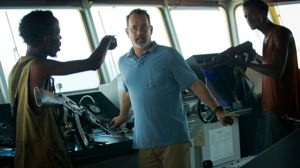Anyone who has battled rush hour traffic knows how difficult the seemingly simple task of getting from one point to another can be. Though the complexity and stress of the situation for someone like you - responsible for organizing and overseeing the daily commute of cast and crew to and from location - is tenfold. And it all pales in comparison to the maritime detour taken by Richard Phillips, captain of the Alabama Maersk, who, in 2008, found himself the captive of Somali pirates after a failed hijacking attempt.
Paul Greengrass's dramatization of the kidnapping (and ensuing military intervention) is replete with those themes and tropes that now feel essential to the Greengrassian aesthetic: ordinary folks in extraordinary situations (United 93), government agents in screen-filled bunkers communicating through headsets in esoteric military jargon (the latter Bourne films), and American everymen navigating exotic and dangerous foreign cultures (Green Zone).
In those films, and particularly in this one, Greengrass labours to balance the tension between the simple requirements of drama - conflict, stakes, change - and the restless verite lens through which he shoots it all.
A conflict of moods that is nakedly apparent in the film's very last scene, when Phillips, clearly in shock, hardly able to speak, is bombarded by questions from an army medic. She's overwhelming him on purpose, trying to keep him focused, conscious; he's covered in blood, and she's not sure how much of it is his. While Hanks, in a pretty affecting fit of Oscar-baiting histrionics, stutters and moans and sobs, the medic, clearly a non-actor, delivers orders and calming platitudes in that automaton drone that most nurses learn to master; sympathetic, but never losing its authority or urgency.
Hanks acts. But the woman playing the medic (who is uncredited, though we hear her introduce herself as "O'Brien") simply is. Neither performance, here, feels false, even though there is an inherent falseness in Hanks' theatrics (which are amazing to behold), and an inherent falseness in the medic's lack of pretense (which is just as riveting). It's in this scene that Greengrass finally finds the note of hysterical realism the first two hours of the film seems to be circling around. He finally gets where he was trying to go.
But, as you probably know, getting from point A to point B can be a thankless job. In fact, several members of the Alabama Maersk's crew have (anonymously) criticized the real-life Richard Phillips for ignoring piracy warnings and plotting a course too close to the Somali Coast. They say that he was too bold. They say he had a death wish--just because he wanted to make his destination within schedule.
Thankless, maybe, but essential. Just think of everything that goes into a big Hollywood production like this; the million-dollar production design, the bombastic visual effects, the cacophony of sound--these are the common elements of cinema, the necessary pieces, and you see them all onscreen. What you don't see is the guy who makes sure the cast and crew make it to set on time, the gas tanks are filled, the drivers have the right maps, that there is enough parking at the location. That's another (perhaps more tangible) example of how authenticity informs drama: the hard work that occurs behind the scenes, the invisible labour that gives melodrama its substantiality.
Ultimately - though it strains a little too hard in the last act to keep the tension high - Captain Phillips manages that balance between authenticity and drama well. It gets to where it needs to go, and does it without meandering too far off course. Which is something, Captain Basso, I'm sure you can appreciate.
Sincerely,

Jared







